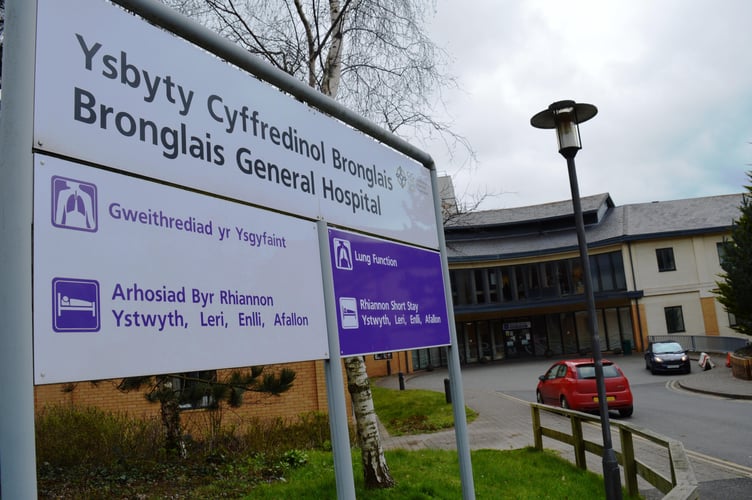THE resilience and dedication of nursing, medical and support staff at Bronglais Hospital’s stroke unit is staggering.
Confronted by a health administration poised to commit an act of patient-care vandalism by hacking away at the region’s declared best stroke service, they refuse to respond with anything less than undimmed optimism.
It’s an odd and disturbing situation. Hywel Dda health board is set on severely cutting back stroke services at Bronglais, assaulting in the process a dedicated and highly skilled multidisciplinary team providing hyper-acute and acute stroke-treatment, and stroke-rehabilitation. The works, in fact, and hooray for them.
As an increasingly indignant public now knows, future stroke patients from Ceredigion, Powys and southern Gwynedd are consequently threatened by the prospect of much of their treatment being carried out at huge distances from home - at Llanelli or Haverfordwest. Either of which constitutes a round-trip of up to 200 miles or more.
The Ystwyth Ward staff, meanwhile, may feel an internal dread for the future well-being of patients they currently care for so well. Adding to their frustration will be the knowledge that the range of treatments the Aberystwyth unit currently provides has been declared second to none.
This is the verdict of the Sentinel Stroke National Audit Programme (SSNAP), an independent expert body which measures the quality and organisation of stroke-care in the NHS across England, Wales and Northern Ireland.
Hywel Dda runs stroke units at Bronglais; Glangwili, Carmarthen; Prince Phillip Hospital, Llanelli; and Withybush Hospital, Haverfordwest.
Of the four, an SSNAP report shows the Bronglais stroke unit performs best. Prince Phillip Hospital where, under the health board’s plan to downgrade the Bronglais unit the bulk of Ystwyth Ward patients would be sent, does worst.
In common with a public now seething over the Hywel Dda proposal, Ystwyth’s stroke team may well be wondering why, with this kind of record, Bronglais should not be accorded the status of a major stroke-treatment centre, which would decisively counter the crushing inequality now in prospect for Mid Wales patients. As such, the unit would be allocated extra staffing and funding.
It’s a measure of the dedication of the Ystwyth staff that they are acting with practical positivity, in stunning contrast to Hywel Dda’s stupendous negativity. Staff nurses, ward sisters, physiotherapists, healthcare support workers, an occupational therapist and the ward clerk, together with families and friends, will on Sunday 1 June climb Yr Wyddfa, Wales’s highest mountain, to raise money for the unit and to raise awareness of strokes.
The team are hoping to reach their target of £5,000, with all money raised donated to the stroke ward to buy rehabilitation equipment and to the Stroke Association of Wales to support stroke survivors. (To donate, visit the team’s Just Giving page at www.justgiving.com/page/ystwyth-ward1)
This month sees the start of Hywel Dda's public consultation on its strategy to transfer patients from Bronglais to deepest south and west Wales. The only thing which will make this exercise not a sham will be a truly major and outspoken public response.
As it stands, this proposal is nothing but a scantily disguised attempt by centrally-based health administrators to continue the obsessive southward migration of Bronglais services.
One of the plan’s worst aspects - unacknowledged by Hywel Dda - is its apparent total disregard for the separation of patients from families and friends. How can the board not be acutely aware of the damaged morale and interference with recovery times inherent in denying stroke victims easy and frequent access to personal support? The human factor appears unrecognised.
In general, the consultation is a chance to blow apart the entrenched clustering of specialist patient-services in the south of the country. Hywel Dda is proving in this matter to be a highly damaging influence. Cardiff administrations - all of them Labour - have been deliberately clueless about recognising, and countering, the harm done by health boards’ rigid refusal to pay proper attention to rural health services.
If this Welsh government wants to retain any credibility over allocation and spread of health resources, it must rapidly impose a national planning framework which would determine that patient services provision finally acknowledged the necessity, for the first time, of a geographical spread governed not solely, as now, by population, but by necessity and equity.
Bombing kids
PICKED out in small triangular flags outside Aberystwyth’s Siop y Pethe, location of many a political protest: Stop bombing kids. Not a message that anyone could ignore. Flanked by two Palestinian flags which could be seen as really just an afterthought.




Comments
This article has no comments yet. Be the first to leave a comment.